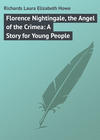Kitobni o'qish: «Florence Nightingale, the Angel of the Crimea: A Story for Young People»
CHAPTER I.
HOW FLORENCE GOT HER NAME – HER THREE HOMES
One evening, some time after the great Crimean War of 1854-55, a company of military and naval officers met at dinner in London. They were talking over the war, as soldiers and sailors love to do, and somebody said: "Who, of all the workers in the Crimea, will be longest remembered?"
Each guest was asked to give his opinion on this point, and each one wrote a name on a slip of paper. There were many slips, but when they came to be examined there was only one name, for every single man had written "Florence Nightingale."
Every English boy and girl knows the beautiful story of Miss Nightingale's life. Indeed, hers is perhaps the best-loved name in England since good Queen Victoria died. It will be a great pleasure to me to tell this story to our own boys and girls in this country; and it shall begin, as all proper stories do, at the beginning.
Her father was named William Nightingale. He was an English gentleman, and in the year 1820 was living in Italy with his wife. Their first child was born in Naples, and they named her Parthenope, that being the ancient name of Naples; two years later, when they were living in Florence, another little girl came to them, and they decided to name her also after the city of her birth.
When Florence was still a very little child her parents came back to England to live, bringing the two children with them. First they went to a house called Lea Hall, in Derbyshire. It was an old, old house of gray stone, standing on a hill, in meadows full of buttercups and clover. All about were blossoming hedgerows full of wild roses, and great elder-bushes heavy with white blossoms; and on the hillside below it lies the quaint old village of Lea with its curious little stone houses.
Lea Hall is a farmhouse now, but it still has its old flag-paved hall and its noble staircase of oak with twisted balustrade, and broad solid steps where little Florence and her sister "Parthe" used to play and creep and tumble. There was another place near by where they loved even better to play; that was the ancient house of Dethick. I ought rather to say the ancient kitchen, for little else remained of the once stately mansion. The rest of the house was comparatively new, but the great kitchen was (and no doubt is) much as it was in the days of Queen Elizabeth.
Imagine a great room with heavy timbered roof, ponderous oaken doors, and huge open fireplace over which hung the ancient roasting jack. In the ceiling was a little trap-door, which looked as if it might open on the roof; but in truth it was the entrance to a chamber hidden away under the roof, a good-sized room, big enough for several persons to hide in.
Florence and her sister loved to imagine the scenes that had taken place in that old kitchen; strange and thrilling, perhaps terrible scenes; they knew the story of Dethick, and now you shall hear it too.
In that old time which Tennyson calls "the spacious days of great Elizabeth," Dethick belonged to a noble family named Babington. It was a fine house then. The oaken door of the old kitchen opened on long corridors and passages, which in turn led to stately halls and noble galleries. There were turrets and balconies overlooking beautiful gardens; and on the stone terraces gay lords and ladies used to walk and laugh and make merry, and little children run and play and dance, and life go on very much as it does now, with work and play, love and laughter and tears.
One of the gay people who used to walk there was Anthony Babington. He was a gallant young gentleman, an ardent Catholic, and devoted to the cause of the beautiful and unfortunate Mary Queen of Scots.
Though ardent and devoted, Babington was a weak and foolish young man. He fell under the influence of a certain Ballard, an artful and designing person who had resolved to bring about the death of the great English Queen, and was induced by him to form the plot which is known in history as Babington's Conspiracy; so he was brought to ruin and death.
In the year 1586 Queen Mary was imprisoned at Wingfield Manor, a country house only a few miles distant from Dethick. The conspirators gathered other Catholic noblemen about them, and planned to release Queen Mary and set her once more on the throne.
They used to meet at Dethick where, it is said, there is a secret passage underground leading to Wingfield Manor. Perhaps – who knows? – they may have sat in the kitchen, gathering about the great fireplace for warmth; the lights out, for fear of spies, only the firelight gleaming here and there, lighting up the dark corners and the eager, intent faces. And when the plot was discovered, and Queen Elizabeth's soldiers were searching the country round for the young conspirators, riding hither and thither along the pleasant country lanes and thrusting their sabres in among the blossoming hedgerows, it was here at Dethick that they sought for Anthony Babington. They did not find him, for he was in hiding elsewhere, but one of his companions was actually discovered and arrested there.
Perhaps – again, who knows? – this man may have been hiding in the secret chamber above the trap-door. One can fancy the pursuers rushing in, flinging open cupboards and presses, in search for their prey; and finding no one, gathering baffled around the fireplace. Then one, chancing to glance up, catches sight of the trap-door in the ceiling. "Ha! lads, look up! the rascal may be hiding yonder! Up with you, you tall fellow!" Then a piling up of benches, one man mounting on another's shoulders – the door forced open, the young nobleman seized and overpowered, and brought down to be carried off to London for trial.
Anthony Babington and his companions were executed for high treason, and Queen Mary, who was convicted of approving the plot, was put to death soon after.
All this Florence Nightingale and her sister knew, and they never tired of "playing suppose" in old Dethick kitchen, and living over again in fancy the romantic time long past. And on Sundays the two children went with their parents to old Dethick church, and sat where Anthony Babington used to sit, for in his days it was the private chapel of Dethick. It is a tiny church; fifty people would fill it to overflowing, but Florence and her sister might easily feel that the four bare walls held all the wild history of Elizabeth's reign.
Anthony Babington in doublet and hose, with velvet mantle, feathered cap, and sword by his side; little Florence Nightingale in round Leghorn hat and short petticoats. It is a long step between these two, yet they are the two most famous people who ever said their prayers in old Dethick church. The lad's brief and tragic story contrasts strangely with the long and beautiful story of Florence Nightingale, a story that has no end.
When Florence was between five and six years old, she left Lea Hall for a new home, Lea Hurst, about a mile distant. Here her father had built a beautiful house in the Elizabethan style, of stone, with pointed gables, mullioned windows and latticed panes. There was a tiny chapel on the site he chose, hundreds of years old, and this he built into the house, so that Lea Hurst, as well as Lea Hall and Dethick, joined hands with the old historic times. In this little chapel, by and by, we shall see Florence holding her Bible class. But I like still to think of her as a little rosy girl, running about the beautiful gardens of Lea Hurst, or playing house in the quaint old summerhouse with its pointed roof of thatch. Perhaps she brought her dolls here; but the dolls must wait for another chapter.
Soon after moving to Lea Hurst, the Nightingales bought still another country seat, Embley Park, in Hampshire, a fine old mansion built in Queen Elizabeth's time, and at some distance from Lea Hurst.
After this the family used to spend the summer at Lea Hurst, and the winter at Embley. There were no railroads then in that neighborhood; the journey was sometimes made by stagecoach, sometimes in the Nightingales' own carriage.
Embley Park is one of the stately homes of England, with its lofty gables, terraces and shadowing trees; and all around it are sunny lawns, and gardens filled with every sweet and lovely flower.
Now you know a little of the three homes of Florence Nightingale, Lea Hall, Lea Hurst, and Embley Park; next you shall hear what kind of child she herself was.
CHAPTER II.
LITTLE FLORENCE
All the boys, and very likely some of the girls, who have got as far as this second chapter, will glance down the page, and exclaim: "Dolls!" Then they will add whatever is their favorite expression of scorn, and perhaps make a motion to lay the book down.
Wait a moment, girls, and boys too! I advise you to read on, and see what came in this case of playing with dolls.
There were a good many thousands of boys in England at that time, in the Twenties and Thirties, who might have been badly off when the terrible Fifties came, if Florence Nightingale had not played with her dolls. Read on, and see for yourselves!
Florence Nightingale loved her dolls dearly, and took the greatest possible care of them; and yet they were always delicate and given to sudden and alarming illnesses. A doll never knew when she might be told that she was very ill, and undressed and put to bed, though she might but just have got on her new frock. Then Mamma Florence would wait upon her tenderly, smoothing her pillow, bathing her forehead or rubbing her poor back, and bringing her all kinds of good things in the doll-house dishes. The doll might feel very much better the next day, and think it was time to get up and put on the new frock again; but she was very apt to have a relapse and go back to bed and gruel again, once at least, before she was allowed to recover entirely.
The truth is, Florence was born to be a nurse, and a sick doll was dearer to her than a strong and healthy one. So I fear her dolls would have been invalids most of the time if it had not been for Parthenope's little family, who often required their Aunt Florence's care. These dolls were very unlucky, or else their mamma was very careless; you can call it whichever you like. They were always tumbling down and breaking their heads, or losing arms and legs, or burning themselves at the nursery fire, or suffering from doll's consumption, that dreadful complaint otherwise known as loss of sawdust. When these things happened, Aunt Florence was called in as a matter of course; and she set the fractures, and salved the burns, and stopped the flow of sawdust, and proved herself in every way a most skillful nursery surgeon and physician.
So it was that unconsciously, and in play, Florence began her training for her life work. She was having lessons, of course; arithmetic, and all the other proper things. She and Parthe had a governess, and studied regularly, and had music and drawing lessons besides; and her father taught her to love English literature, and later opened to her the great doors marked Latin and Greek. Her mother, meantime, taught her all kinds of handiwork, and before she was twelve years old she could hemstitch, and seam and embroider. These things were all good, and very good; without them she could not have accomplished all she did; but in the years that were to come all the other learning was going to help that wonderful learning that began with nursing the sick dolls.
Soon she was to take another step in her profession. The little fingers grown so skillful by bandaging waxen and china arms and legs, were now to save a living, loving creature from death.
To every English child this story is a nursery tale. No doubt it is to many American children also, yet it is one that no one can ever tire of hearing, so I shall tell it again.
Much as Florence loved dolls, she loved animals better, and in her country homes she was surrounded by them. There was her dog, who hardly left her side when she was out of doors; there was her own pony on which she rode every day over dale and down; her sister's pony, too, and old Peggy, who was too old to work, and lived in a pleasant green paddock with nothing to do but amuse herself and crop grass all day long. Perhaps Peggy found this tiresome, for whenever she saw Florence at the gate she would toss her head and whinny and come trotting up to the gate. "Good morning, Peggy!" Florence would say. "Would you like an apple?"
"Hooonh!" Peggy would say. (Horses have no spelling books, and there is no exact rule as to how a whinny should be spelled. You may try any other way that looks to you more natural.)
"Then look for it!" Florence would reply. At this Peggy would sniff and snuff, and hunt round with her soft velvety nose till she found Florence's pocket, then delicately take out the apple and crunch it up, and whinny again, the second whinny meaning at once "Thank you!" and "More, please!" Horse language is a simple one compared to English, and has no grammar.
Well, one day Florence was riding her pony in company with her friend the vicar. This good man loved all living creatures, but there were few dearer to him than Florence Nightingale. They had the same tastes and feelings. Both loved to help and comfort all who were "in trouble, sorrow, need, sickness, or any other adversity." He had studied medicine before he became a clergyman, and so was able to tell her many things about the care of the sick and injured. Here was another teacher. I suppose everyone we know could teach us something good, if we were ready to learn.
As I said, Florence and the vicar were riding along on the green downs; and here I must stop again a moment to tell you what the downs are, for when I was a child I used to wonder. They are great rounded hills, covered with close, thick turf, like a velvet carpet. They spread in long smooth green billows, miles and miles of them, the slopes so gentle that it is delightful to drive or ride on them; only you must be careful not to go near the edge, where the green breaks off suddenly, and a white chalk cliff goes down, down, hundreds of feet, to the blue sea tossing and tumbling below. These are the white cliffs of England that you have so often read about.
Am I never going on with the story? Yes; have patience! there is plenty of time.
There were many sheep on the downs, and there was one special flock that Florence knew very well. It belonged to old Roger, a shepherd, who had often worked for her father. Roger and his good dog Cap were both friends of Florence's, and she was used to seeing them on the downs, the sheep in a more or less orderly compact flock, Cap guarding them and driving back any stragglers who went nibbling off toward the cliff edge.
But to-day there seemed no order anywhere. The sheep were scattered in twos and threes, straying hither and thither; and old Roger alone was trying to collect them, and apparently having a hard time of it.
The vicar saw his trouble, and rode up to him. "What is the matter, Roger?" he asked kindly. "Where is your dog?"
"The boys have been throwing stones at him, sir," replied the old man. "They have broken his leg, poor beast, and he will never be good for anything again. I shall have to take a bit of cord and put an end to his misery."
"Oh!" cried Florence, who had ridden up with the vicar. "Poor Cap! Are you sure his leg is broken, Roger?"
"Yes, Miss, it's broke sure enough. He hasn't set foot to the ground since, and no one can't go anigh him but me. Best put him out of his pain, I says."
"No! no!" cried Florence. "Not till we have tried to help him. Where is he?"
"He's in the cottage, Missy, but you can do nothing for him, you'll find. Poor Cap's days is over. Ah; he were a good dog. Do everything but speak, he could, and went as near to that as a dumb beast could. I'll never get another like him."
While the old man lamented, Florence was looking eagerly in the face of the clergyman. He met her look with a smile and nod.
"We will go and see!" he said; and off they rode, leaving Roger shaking his head and calling to the sheep.
They soon reached the cottage. The door was fastened, and when they tried to open it a furious barking was heard within. A little boy came from the next cottage, bringing the key, which Roger had left there. They entered, and there lay Cap on the brick floor, helpless and weak, but still barking as hard as he could at what he supposed to be intruders. When he saw Florence and the little boy he stopped barking, and wagged his tail feebly; then he crawled from under the table where he lay, dragged himself to Florence's feet and looked up pitifully in her face. She knelt down by him, and soothed and petted and talked to him, while the good clergyman examined the injured leg. It was dreadfully swollen, and every touch was painful; but Cap knew well enough that the hands that hurt were trying to help him, and though he moaned and winced, he licked the hands and made no effort to draw the leg away.
"Is it broken?" asked Florence anxiously. "No," said the vicar. "No bones are broken. There's no reason why Cap should not recover; all he needs is care and nursing."
Florence quietly laid down her riding whip and tucked up her sleeves. "What shall I do first?" she said.
"Well," said the vicar, "I think a hot compress is the thing." Florence looked puzzled; the dolls had never had hot compresses. "What is it?" she asked.
"Just a cloth wrung out in boiling water and laid on, changing it as it cools. Very simple, you see, Nurse Florence! The first thing is to light the fire."
That was soon done, with the aid of the boy, who hovered about, interested, but ignorant of surgery. On went the kettle, and soon it was boiling merrily; but where were the cloths for the compresses? Florence looked all about the room, but could see nothing save Roger's clean smock frock which hung against the door.
"This will do!" she cried. "Mamma will give him another."
The vicar nodded approval. Quickly she tore the frock into strips of suitable width and length; bade the boy fill a basin from the kettle, and then kneeling down beside the wounded dog, Florence Nightingale for the first time gave "first aid to the wounded."
As the heat drew out the inflammation and pain, Cap looked up at the little helper, all his simple dog heart shining in his eyes; the look sank into the child's heart and deepened the tenderness already there. Another step, and a great one, was taken on the blessed road she was to travel.
Florence came again the next day to bandage the leg; Cap got entirely well, and tended sheep for many a year after that; and old Roger was very grateful, and Mrs. Nightingale gave him a new smock frock, and everyone was happy; and that is the end of the story.
CHAPTER III.
THE SQUIRE'S DAUGHTER
It soon became a recognized thing in Florence's own home and in all the neighborhood, that she was one of the Sisters of Mercy. Nothing was too small, no creature too humble to awaken her sympathy and tenderness. When the stable cat had kittens, Florence was the first to visit them, to fondle the tiny creatures and soothe their mother's angry fear. When she walked along the pleasant wood roads of Lea Hurst, the squirrels expected nuts as a matter of course, and could hardly wait for her to give them. When anyone in the village or farm fell ill, it was Florence who was looked for to cheer and comfort. Mrs. Nightingale was a most kind and charitable lady, and delighted in sending delicacies to the sick. It was Florence's happy privilege to carry them, and whether she walked or rode there was apt to be a basket on her arm or fastened to her saddlebow.
If you think hard, you can see – at least I can – just how it would be. Old Goody Brown's rheumatism, let us say, was very bad one morning. You children who read this know little about rheumatism. Very likely you think it rather a funny word, and that it is just a thing that old people have, and that they make a good deal of fuss about. If it were a toothache, now, you say, or colic – but the truth is, no pain is in any way pleasant. If a red-hot sword were run into your back you would not like it? Well, sometimes rheumatism is like that.
So old Goody Brown was suffering, and very cross, just as we might be; and nothing suited her, poor old soul; her tea was too hot, and her porridge too cold, and her pillow set askew, and – dear! dear! dear! she wished she was dead, so she did. Martha, her good patient daughter, was at her wits' ends.
"Send to the 'All'!" said poor old Goody. "Send for Miss Florence! She'll do something for me, I know."
So a barefoot boy would trudge up to the great house, and very soon a light, slight figure would come quickly along the village street and enter the cottage. A slender girl, quietly dressed, with perfect neatness and taste; brown hair smoothly parted, shining like satin; gray-blue eyes full of light and thoughtfulness; regular features, an oval face, cheeks faintly tinted with rose – this was Florence Nightingale.
I cannot tell you just what she had in the little basket on her arm, whether jelly or broth or chicken or oranges; there was sure to be something good beside the liniment and medicines to help the aching back and limbs. But the basket held the least of what she brought. At the very sound of her voice the fretful lines melted away from the poor old face. I cannot tell you – I wish I could – the words she said, this little Sister of Mercy, yet I can almost hear her speak, in that sweet, cordial voice whose range held no harsh note; can see her setting the pillow straight and smooth, making the little tray dainty and pretty with the posy she had brought, coaxing the old woman to eat, making her laugh over some story of her pets and their droll ways. Perhaps before leaving she would open the worn Bible or prayer book, and read a psalm; can you not see her sitting by the bedside, her pretty head bent over the book, her face full of tenderness and reverence? I am sure that when she went away there was peace and comfort in that cottage room, and that heartfelt blessings followed the "Angel Child" as she went on her homeward way. "She had a way with her," they said; and that meant more than volumes of praise.
The flowers that Florence used to carry were from her own garden, I like to think. Both at Lea Hurst and Embley, she and her sister had each her own little garden and gardening tools. Florence was a good gardener; indeed, I think she was a good everything that she tried to be, just because she tried. She dug, and sowed, and watered, pruned and tied up and did all the things a garden needs; and so her garden was full of flowers all summer long, giving delight to her and to every sick or lonely or sorrowful person for miles around.
As Florence and her sister grew older they became more and more helpful to their parents in the good works that they both loved to carry on. I have read a delightful account of the "feast day" of the village school-children, as it used to be given at Lea Hurst when Florence was a girl.
The children gathered together at the school-house, all in their best frocks and pinafores, and walked in procession up the street and through the fields to Lea Hurst. Each child carried a posy and a stick wreathed with flowers, and at the head of the procession marched a band of music, provided by the good squire. In the field below the garden tables were set, and here Mrs. Nightingale and her daughters, aided by the servants, served tea and buns and cakes, waiting on their little guests, and seeing that every child got all he wanted – or at least all that was good for him. Then when all had eaten and drunk their fill, the band struck up, and the boys and girls danced on the green to their hearts' content.
What did they dance? Polkas, perhaps, and the redowa, a pretty round dance with a good deal of stamping in it; and of course Sir Roger de Coverley, which is very like our Virginia Reel. (If you do not know about Sir Roger de Coverley himself, ask papa to tell you or read you about him, for he is one of the pleasantest persons you will ever know.)
Perhaps they sang, too; perhaps they sang the pretty old Maypole Song. Do you know it?
Come lasses and lads, get leave of your dads,
And away to the Maypole hie,
For ev'ry fair has a sweetheart there,
And the fiddler's standing by.
For Willy shall dance with Jane,
And Johnny has got his Joan,
To trip it, trip it, trip it, trip it,
Trip it up and down.
"You're out!" says Dick, "not I," says Nick,
"'Twas the fiddler play'd it wrong."
"'Tis true," says Hugh, and so says Sue,
And so says ev'ry one;
The fiddler then began
To play the tune again,
And ev'ry girl did trip it, trip it,
Trip it to the men.
Then when feast and dance and song were all over, it was time to reform the procession and take up the homeward march. The two sisters, Florence and Parthe, had disappeared during the dancing; but now, as the procession passed along the terrace, there they were, standing behind a long table; a table at sight of which the children's eyes grew round and bright, for it was covered from end to end with presents. Such delightful presents! Books, and pretty boxes and baskets, thimble-cases and needle-books and pin-cushions; dolls, too, I am sure, for the little ones, and scrap-books, and – but you can fill up the list for yourself with everything you like best in the way of pretty, simple, useful gifts. I am quite sure that Florence would not have wished to give the children foolish or elaborate gimcracks, and that Mr. Nightingale would never have allowed it if she had; and I think it probable that many of the gifts were made by the two sisters and their kind and clever mother.
All about Lea Hurst, in many and many a pleasant cottage home, those little gifts are treasured to-day like the relics of some blessed saint; which indeed is just what they are. The saint is still living, and some of the children of the school feasts are living, too, and now in their age will show with pride and joy the gifts they received long ago from the hands of the beloved Miss Florence.
As Florence grew up to womanhood she found more and more work to do. There were mills and factories in the neighborhood of Lea Hurst; and in the hosiery mills, especially, hundreds of women and girls were employed, many of whom lived on the Nightingale estate.
She may have been seventeen or eighteen when she started her Bible class for the young women of the district, holding it in the tiny ancient chapel at Lea Hurst which I described in the first chapter. Gathering the girls around her, she would read a chapter from the Bible, and then give them her thoughts about it, and explain the difficult passages; then they would all sing together, her sweet, clear voice leading the hymns. Here is another memory very precious to the old women who were once those happy girls. They love to tell "how beautifully Miss Florence used to talk."
Long years after, when Miss Nightingale, spent with her noble labors, would come to Lea Hurst for a time of rest and refreshment, the daughters of these girls counted it a high privilege to gather on the lawn under her window and sing to her as she sat in the room above; and would go home proud and happy as queens if they had seen the saintly face smiling from the window.
Shall I try to show you Florence Nightingale at seventeen? Her face was little changed from that of the girl we saw in the cottage, cheering old Goody Brown. She still wore her hair brushed smoothly "Madonna-wise" on either side her face; often, now, she wore a rose at the side, tucked in among the shining braids or coils. You would think her frocks very queer if you saw them to-day, but then they were extremely pretty; full skirts (no crinoline! that was to come later) and full sleeves, with broad flat collar of lace or embroidery. When she went to church or to make visits she wore a spencer, a kind of full plaited jacket with a belt, something like a Norfolk jacket – only different! and a Leghorn bonnet. You have seen pictures of the Leghorn bonnets of the Thirties and Forties; "coal-scuttles," some people called them, and they were something the shape of a scuttle. Some of them were enormous in size, and they look queer enough now in the pictures, or – if your grandmamma had a way of keeping things – in the "dress-up" trunk or cupboard in the attic. But people who were young in those days tell me that they were extremely becoming, and that a pretty face never looked prettier that when it peeped out from the depths of a huge straw "coal-scuttle."
When Florence rode on horseback, her habit was so long that it nearly touched the ground (that is, if she followed the fashion of the day, but I should not wonder a bit if she and her mother were too sensible!) and she wore a round, broad-brimmed hat with long ostrich plumes. I remember a picture of the Princess Royal (afterwards Empress Frederick of Germany), in a costume like this, which I thought one of the most beautiful things I ever saw, so I shall imagine Florence, on an afternoon ride with the squire, let us say, dressed in this way; but when scampering about on her pony, I trust, she wore a less cumbrous costume.
You will remember that the Nightingales spent the winter at Embley Park, in Hampshire. Here, too, Florence was busy in good and helpful work. At Christmas time she found her best pleasure in giving presents to young and old among the poor people about her, in getting up entertainments for the children, training them to sing, arranging treats for the old people in the poorhouse. On Christmas Eve the village carol singers would come and sing on the lawn; old English carols, that had been sung by generation after generation. Poor Anthony Babington over at Lea Hall may have listened on Christmas Eve to the same sweet old songs.
As Joseph was a-walking,
He heard an angel sing,
"This night shall be the birthnight
Of Christ our heavenly King.
"His birth-bed shall be neither
In housen nor in hall,
Nor in the place of paradise,
But in the oxen's stall.
"He neither shall be rockèd
In silver nor in gold,
But in the wooden manger
That lieth in the mold.
"He neither shall be washen
With white wine nor with red,
But with the fair spring water
That on you shall be shed.
"He neither shall be clothèd
In purple nor in pall,
But in the fair white linen
That usen babies all."
As Joseph was a-walking,
Thus did the angel sing,
And Mary's son at midnight
Was born to be our King.
Then be you glad, good people,
At this time of the year;
And light you up your candles,
For His star it shineth clear.
Then who so glad as Florence to call the singers in and bid them welcome and "Merry Christmas!" and aid in distributing the mince pies and silver coins which were always their due.



















